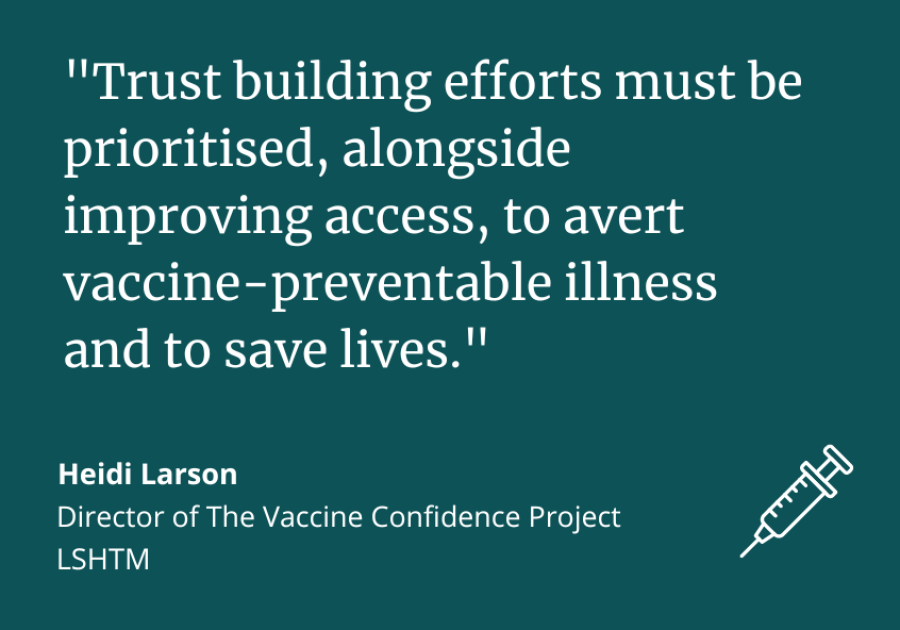Confidence in child vaccination declined during COVID-19 pandemic, report says
20 April 2023 London School of Hygiene & Tropical Medicine London School of Hygiene & Tropical Medicine https://lshtm.ac.uk/themes/custom/lshtm/images/lshtm-logo-black.png
Public perceptions of the importance of child vaccination declined in 52 out of 55 countries studied during the COVID-19 pandemic, according to the latest edition of UNICEF’s State of the World’s Children report.
In some countries, vaccine confidence declined by up to 44 percentage points, highlighting the need to build confidence in and demand for vaccines, and invest in strengthening health systems.
Launched today, the 2023 edition of the report is the first to be solely dedicated to routine immunization and includes key vaccine confidence data contributed by the Vaccine Confidence Project (VCP) at the London School of Hygiene & Tropical Medicine (LSHTM).
The report reveals that as many as 67 million children missed out on vaccinations between 2019 and 2021, with 112 countries reporting a decrease in levels of vaccination coverage. In the Republic of Korea, Papua New Guinea, Ghana, Senegal and Japan, perception of the importance of child vaccination declined by more than one third. Conversely, China, India and Mexico were the only countries studied where such perceptions remained the same or improved.
Since 2015, the VCP has been collecting Vaccine Confidence Index data, surveying over 300,000 individuals in over 150 countries. The data in the UNICEF report represents a subset of this full data set, including information on changes of confidence in vaccines between 2015 and 2019, and since 2021, as presented in Chapter 4 of the report.
This chapter (entitled ‘How can we build vaccine confidence?’) discusses the rising evidence behind the decline in vaccine confidence in many countries. Individuals under 35 were less confident in vaccines after the COVID-19 pandemic in all of the 55 countries analysed in the report except Mexico, India, China and Sweden, while women were less confident in all countries accept Mexico and China. The report emphasises the need for stronger action to reassure parents and caregivers (for example through community engagement, social listening and vaccine education).
Heidi Larson, Professor of Anthropology, Risk and Decision Science and Founding Director of the Vaccine Confidence Project at LSHTM, said:
“Our Vaccine Confidence Index findings reveal the impact of the COVID-19 response on waning public confidence in vaccination more broadly. This is particularly concerning given that it comes amid the largest sustained backslide in childhood immunisation in 30 years and should serve as a warning sign to national immunization managers and policy makers. Trust building efforts must be prioritised, alongside improving access, to avert vaccine-preventable illness and to save lives.”
The full VCP data set can be accessed via an interactive map tool. More information on the Vaccine Confidence Index can be found here.
LSHTM's short courses provide opportunities to study specialised topics across a broad range of public and global health fields. From AMR to vaccines, travel medicine to clinical trials, and modelling to malaria, refresh your skills and join one of our short courses today.